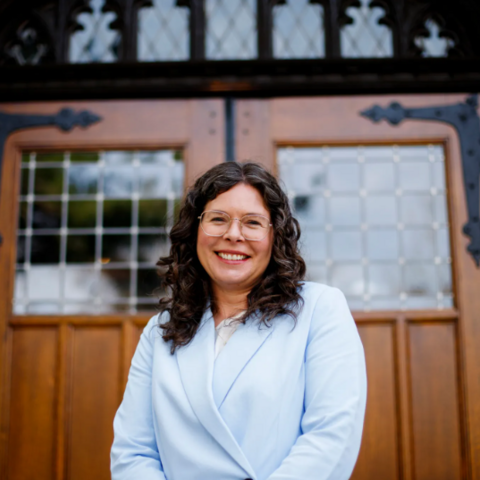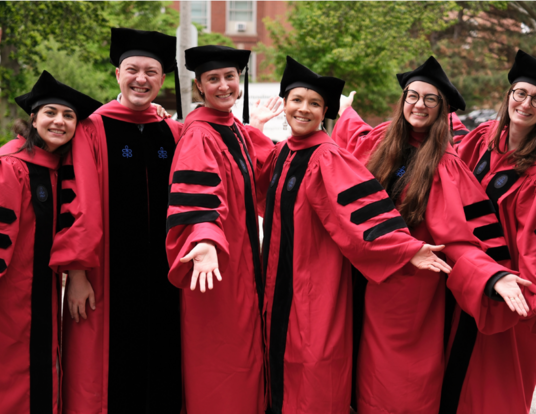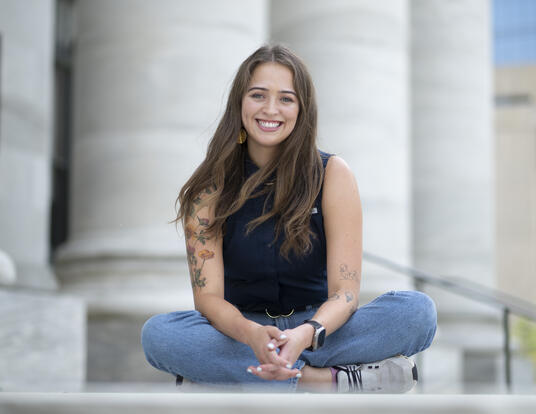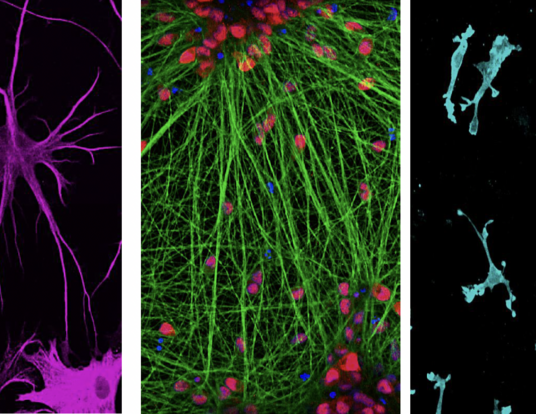Higher Calling
Air Force pilot sets her sights on elevating military strategy and policy
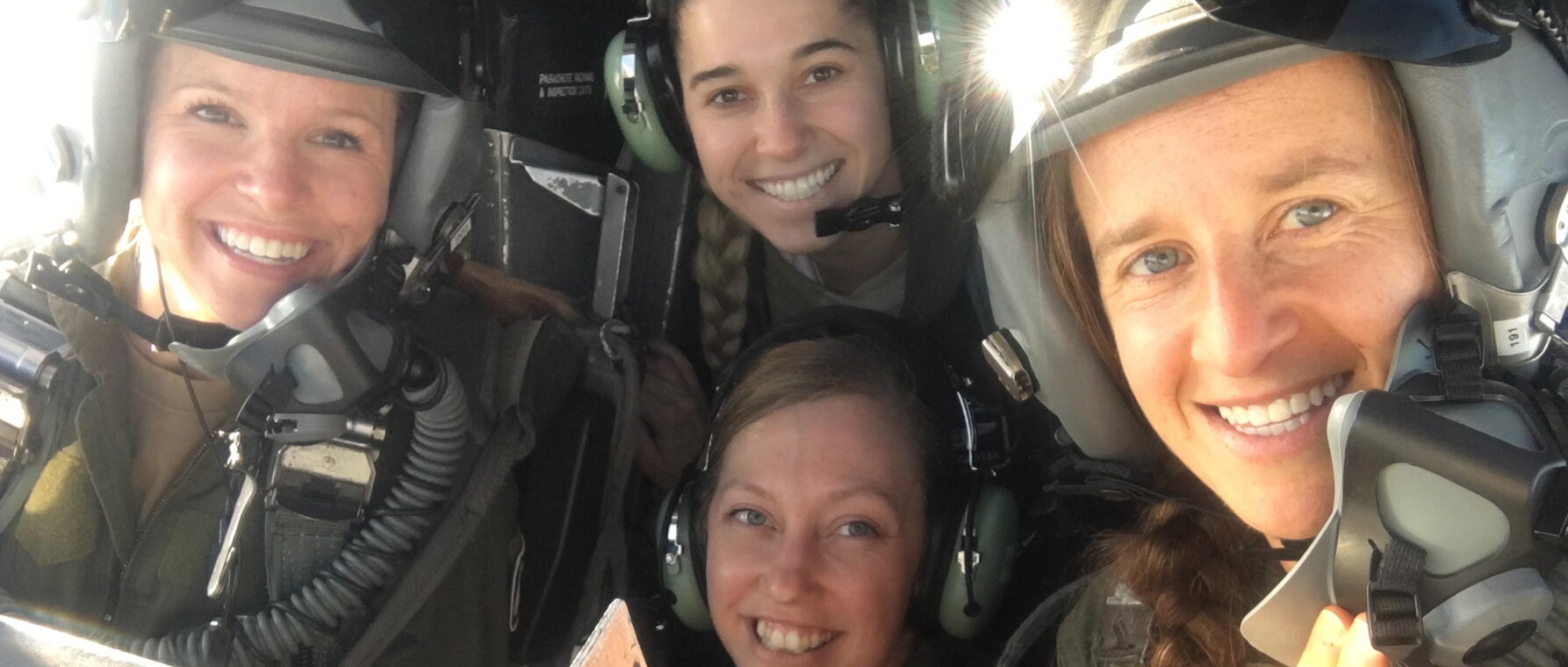
Research at Risk: Since World War II, universities have worked with the federal government to create an innovation ecosystem that has yielded life-changing progress. Now much of that work may be halted as funding is withdrawn. Find out more about the threats to medical, engineering, and scientific research, as well as how Harvard is fighting to preserve this work—and the University's core values.
If 15-year-old Roni Yadlin had been sitting any closer to the launchpad, she would have needed protection from the blast. It was 2003, and her father had traveled with her from their home in southern California to see the liftoff of the space shuttle Columbia. Yadlin, who dreamed of being an astronaut, was thrilled.
“It was just an incredible experience seeing it,” she says. “It was so motivating. And then going to the Astronaut Hall of Fame and all the museums—getting to see the Saturn V rocket, the history of the Apollo launches—instilled excitement and a spark of curiosity for me.”
When Columbia later disintegrated during reentry with all hands lost, Yadlin was devastated. But she was also inspired by the courage and sacrifice of the space shuttle’s crew. That inspiration led her to a career in the United States Air Force, where she has flown some of the military’s most advanced supersonic aircraft. It also led her to Harvard’s Kenneth C. Griffin Graduate School of Arts and Sciences (Harvard Griffin GSAS), where she has conducted research that will help military leaders better understand ideological extremism among soldiers and veterans. And, like the aircraft she flies, Yadlin has moved fast, completing her PhD in only three years.
A Focus on Goals
Given her roots, it might have been surprising if Yadlin had not gotten her PhD at some point in her career. Her father earned a PhD in aeronautical engineering from Cornell and worked over 30 years for the Boeing Company, manufacturers of commercial and defense industry aircraft. Her mother holds a doctorate in music, focused on choral conducting. Her grandfather, Aharon Yadlin, served as the Israeli minister of education in the 1970s. Her other grandfather, Robert Abraham, spent his career working in public education in New York. “The idea of the importance of school has always been a really big part of my whole family's life,” Yadlin says.
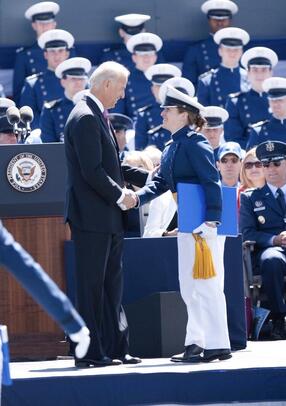
Another big part of Yadlin’s family life was Jewish identity. When Yadlin was young, she lived in Israel on a kibbutz she describes as “secular” but also “tight-knit.” Friday night Shabbat dinners and Passover seders in the communal dining hall were a central focus of life there. “It instilled the importance of the communal aspect of Judaism for me,” Yadlin notes.
When her family returned to the states, they eventually settled in southern California. Yadlin’s interest in flying was sparked in part by her father, who had served in the Israeli Air Force, training as a pilot with Ilan Ramon, the Israeli astronaut who perished on the Columbia. Still focused on her goal of becoming an astronaut, Yadlin attended the US Air Force Academy to study astronautical engineering. There, she was part of a significant but small minority; only about 20 percent of cadets in her class were women. Being surrounded by young men was an adjustment for someone who had grown up in a house full of sisters.
“In some ways it was great, especially because of how close you get going through basic training and the challenges of the Academy,” she says. “I gained a group of brothers. But as a woman, you’re always in the minority. You notice it every time you walk into a room. That feeling never really goes away.”
[Living on a kibbutz in Israel] instilled the importance of the communal aspect of Judaism for me.
– Roni Yadlin
It was on the soccer pitch that Yadlin found a community of sisters. “That’s where I could go and be surrounded by women supporting each other,” she says. “Everybody there knew what it felt like to be the only woman in the room. Having that outlet helped me through.”
After graduating from the Academy in 2009 Yadlin took her passion for engineering—and soccer—with her to the University of Oxford in the United Kingdom. There she continued working on the design, construction, and testing of satellites—all good experience for an aspiring astronaut. She also continued to play sports—this time in a football-crazed country. After joining the Oxford women’s soccer team, Yadlin’s season might have ended after she broke an ankle early on. She dedicated herself to rehabilitation, however, and returned in time to help the team win a national championship.
“There was a trophy ceremony, then a celebration dinner at Sheffield United’s stadium,” she says. “We got to go on the pitch, into the boxes. That was incredible—to be standing on the field of a professional English football team. On the bus ride back, it was just celebration the whole way—music blasting, people dancing in the aisles. I felt bad for the bus driver, but it was such joy.”
Learning to Fly—and Change Course
Oxford was followed by 13 months of pilot training stateside in Wichita Falls, Texas. When she was finished, Yadlin flew the MC-12 tactical reconnaissance aircraft for two years—including two deployments to Afghanistan. When the MC-12 platform transitioned to the Army, an opportunity opened for Yadlin to fly one of the most powerful planes in the US military: the supersonic B1-B Lancer.
“I remember the first time pushing the engines up to afterburner,” she says. “The jet shakes a little and you hear that roar. From that first time through the 100th time—every time I heard a B-1 take off, or felt that roar—I thought, ‘This is really cool.’”
So far, so good. Yadlin was progressing to her goal of being an astronaut. The next step was test-pilot school . . . and heartbreak.
“I applied and got to the flying interview stage,” she says. “One thing you need as a test pilot is to be very precise. And I just wasn’t quite there. I was good, but not good enough. That basically closed the astronaut door.”
Then a major in the Air Force, Yadlin was forced for the first time to rethink her life path. With a love of learning and an interest in military strategy, she enrolled at the Air Force’s School of Advanced Air and Space Studies (SAASS). The master’s-level program offered outstanding students the opportunity upon completion to get their PhD at an outside university and return, eventually to teach at SAASS. “That’s how I ended up at Harvard,” Yadlin says.
Earning her PhD in only three years as required by the Air Force has been a challenge, even by Yadlin’s formidable standards. She had to have her dissertation project almost entirely mapped out on her first day of enrollment and make it the focus of all her effort and attention. “I couldn’t afford to teach or be a research assistant,” she says. “Everything had to be focused on my final project. It was intense and focused, with not much time to explore outside the path.”
I remember the first time pushing the [B-1] engines up to afterburner. The jet shakes a little and you hear that roar. From that first time through the 100th time—every time I heard a B-1 take off, or felt that roar—I thought, “This is really cool.”
–Roni Yadlin
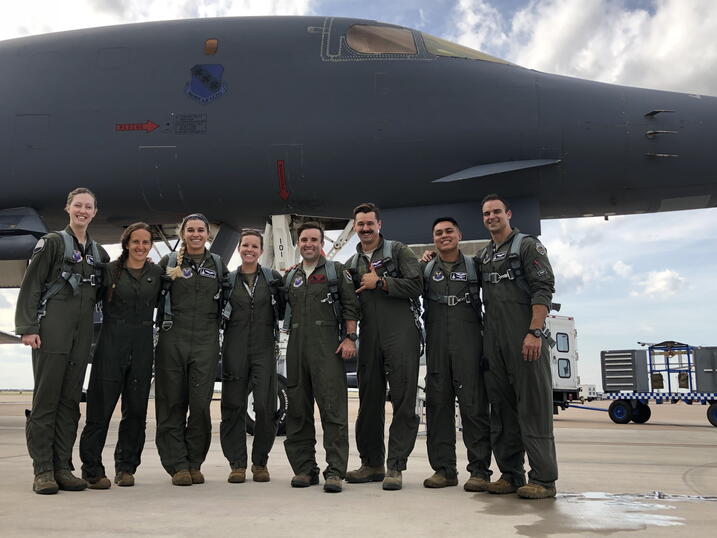
The Enemy Within
Yadlin’s faculty mentor, Harvard Kennedy School (HKS) Professor Dara Key Cohen, says that the PhD candidate’s research is informed by her own lived experience as an Air Force pilot, and was inspired by the puzzle of why so many current and former members of the US military participated in the January 6, 2021 insurrection. “Her dissertation, ‘The Enemy Within,’ is a rigorous study of extremism in the military, combining insights from multiple disciplines with original data,” Cohen says. “Her empirical work sheds critical light on understudied patterns of extremism across time and service branches, and her theoretical contributions weave together insights from multiple disciplines.”
For her research, Yadlin adopts the US military’s definition of extremism as “active advocacy” of “supremacist, extremist, or criminal gang doctrine, ideology, or causes, including those that advance, encourage, or advocate the use of force, violence, or criminal activity or otherwise advance efforts to deprive individuals of their civil rights.”
“My focus was on extremist action, rather than simply ideological belief,” Yadlin explains. “Things like participating in specific groups, rallies, distributing materials—or even now, liking content on social media related to those ideologies.”
Yadlin created a database of nearly 1,000 cases of extremist-related criminal activity involving members of all six branches of the US armed services, then conducted both quantitative and social-network analysis on the data. To get a more layered understanding of the different services, she also did a cultural analysis, looking at each branch’s foundational documents, mottos, and values, as well as how they approach indoctrination and training.
The good news in her findings is that extremism among active-duty service members is quite low, especially among the officer corps. More troubling is Yadlin’s conclusion that, while society invests in military members immense authority and trust to use violence on behalf of the state, it puts less thought into what happens when servicemembers leave the military.
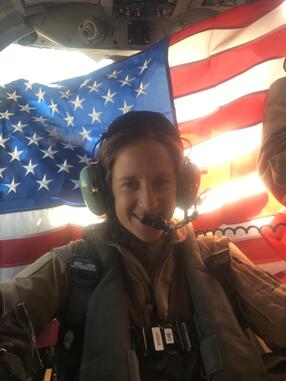
“We train people to break moral inhibitions, to dehumanize the enemy, and to overcome their reluctance to kill,” she says. “We’ve become very effective at that. But we don’t do anything to help people reintegrate—to rebuild moral guardrails or reverse the training.”
Because of the skills that military personnel have, Yadlin says, they can be much more effective in organizing militia-type groups and executing violence as civilians. “A relatively small group of extremists can do a disproportional amount of damage to civil society,” she notes. The solution, Yadlin argues, is to provide service members with tools to reintegrate into civilian life before they are discharged. “There needs to be a concerted effort to shift them away from ideas of desensitization to violence and to reengage their moral barriers,” she asserts. “We have to think about the ways we've intentionally changed them into servicemembers and help them turn back into civilians.”
Yadlin’s dissertation advisor, HKS Professor Erica Chenoweth, says the research uncovers social determinants of extremist behavior in ways that point to straightforward policy responses. “A lot of prior research focuses on ‘mechanisms of moral disengagement’ as a way of explaining the slide into extremist behavior,” Chenowith observes. “But Roni’s work also suggests the need for ‘mechanisms of moral reengagement’ to support reentry into civilian life, particularly for those who have prepared for or engaged in combat roles. This is a really promising way to frame the task ahead, and it’s hard to imagine more important work.”
A Different Lens
Thinking critically has been a big part of Yadlin’s experience at Harvard Griffin GSAS. After spending almost two decades in the military—including her time at the Air Force Academy—Yadlin had been surrounded by people who approached problems in similar ways. So, when she got to Harvard, one of the first things she did was register for a class that would challenge her to think differently.
Roni is the first female active-duty military student to receive a PhD in public policy, from [Harvard]. I am certain that she will serve as an inspiration to those who may want to follow in her footsteps.
–Professor Dara Kay Cohen
“I took a philosophy course about the role of groups in society,” she says. “I hadn’t felt as uncomfortable in an academic setting in a very long time. The assignments were so different from anything I’d read! I always knew there were many ways to solve a problem. This class helped me realize there are many ways to define a problem—and the kinds of questions you ask in the process will shape the solutions you come up with.”
Perhaps most valuable for Yadlin has been the diversity of viewpoints she’s encountered during her time at Harvard. “In the classroom, you had the academic freedom to say, free of judgment, what you believe, what you think, and have dialogue,” she says. “That was fantastic. I was able to sit in those rooms and bring the military perspective to people who had very little understanding of the services. I was able to learn from so many people from other countries, backgrounds, and academic disciplines.”
Cohen says that Yadlin’s presence at Harvard sets a precedent for others like her. “Roni is the first female active-duty military student to receive a PhD in public policy, from the University” she notes. “I am certain that she will serve as an inspiration to those who may want to follow in her footsteps.”
After graduation, Yadlin will eventually join the faculty of SAASS, where she hopes to train her colleagues to become better officers—and better people. First, though, comes two years at Air Force Global Strike Command, which oversees the country’s bombers and intercontinental ballistic missiles. There, she will sit at the epicenter of nuclear and conventional deterrence strategy. When she does, Roni Yadlin will bring with her the ability to understand a problem from many different perspectives that she developed at Harvard.
“Going back into strategy and policy for the Air Force,” she says, “my PhD experience will allow me to bring another viewpoint into those brainstorming rooms—rooms full of people I used to be just like. Now I can offer a different lens.”
Get the Latest Updates
Join Our Newsletter
Subscribe to Colloquy Podcast
Simplecast


